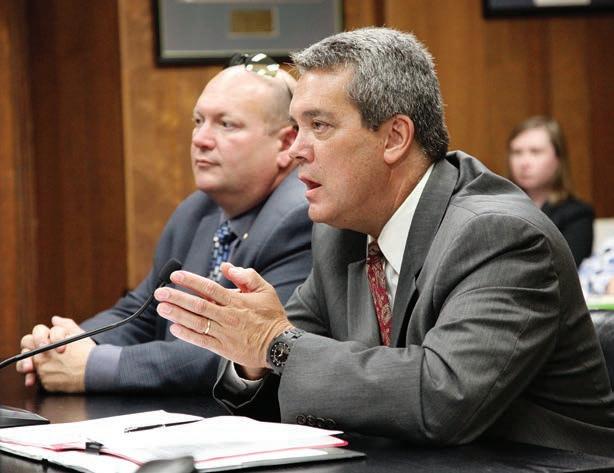
2 minute read
Sheriffs appear before behavioral health task force
COMMITMENT
Continued From Page 17 <<<
meeting of the CJAA and ASA executive boards, the boards voted to advocate for these vital programs to be commenced in Arkansas to immediately help combat our unprecedented local jail and state prison overcrowding crisis.
We are committed to vigilantly impress upon the governor and general assembly the urgent need for regional Crisis Stabilization Units in Arkansas for use in placement of the mentally ill for medical clearance, assessment and direction into appropriate treatment. We are going to impress upon the governor and general assembly the urgent need for crisis intervention training (such as exists in 45 other states), which will train law enforcement to recognize encounters with the mentally ill and to deescalate confrontations with the citizenry in general.
Finally, we continue to stress that in 2009 the National Alliance on Mental Illness (NAMI) graded Arkansas as an “F” in its report on America’s Health Care System for Adults with Serious Mental Illness. NAMI was explicit and identified the following urgent needs: “Evidence-based practices, crisis services, CIT and jail diversion and services for the homeless.” Without access and implementing the successes of others, will Arkansas be resigned to continue to suffer year after year from a chronic jail- and prisonovercrowding crisis? Will the general assembly undertake its responsibility under Article 19, Section 19 of the Arkansas Constitution to “provide for the treatment of the insane?” Or will the state of Arkansas continue to rank at the very bottom among the states for our system for treating the mentally ill?
If the general assembly just restored the $7.9 million in funding it cut from Community Mental Health Centers in 2013, we could have regional crisis stabilization units in Arkansas. What has a greater priority than public safety?
There is hope for our state. Absent commitment and follow through, Arkansas will be relegated to languish at the very bottom of these rankings among the states. However, the governor and general sssembly have committees working diligently for advancement on criminal justice reform, behavioral health, health care, highway/local road funding and 911 funding and efficiencies. We’re encouraged and hopeful about these task forces and working groups. The level of commitment many of our state and local official share is the catalyst for advancement. We desperately need this commitment to translate into action.
On the Web:
Look for the National Alliance on Mental Illness’ report Grading the States 2009 at www.arcounties.org
Search “Grading the States.”
Sheriffs appear before task force
Craighead County Sheriff Marty Boyd, Crawford County Sheriff Ron Brown, Sebastian County Sheriff Bill Hollenbeck and Arkansas Sheriffs’ Association Executive Director Ronnie
Baldwin appeared before the Behavioral Health Treatment Access Legislative Task Force on Wednesday, Aug. 12, 2015. The sheriffs discussed their experiences with mentally ill persons, testified that the mentally ill should be treated rather than imprisoned, and asked for funding to provide Crisis Intervention Training for law enforcement officers. The task force was created earlier this year by Act 895, or the Criminal Justice Reform Act of 2015. It and the Legislative Criminal Justice Oversight Task Force are working to find ways to deal with prison and jail overcrowding through implementation of mental health, drug treatment and job training reforms. “I need room in my jail for rapists, burglars, bad guys ...,” Sheriff Hollenbeck told the task force.




